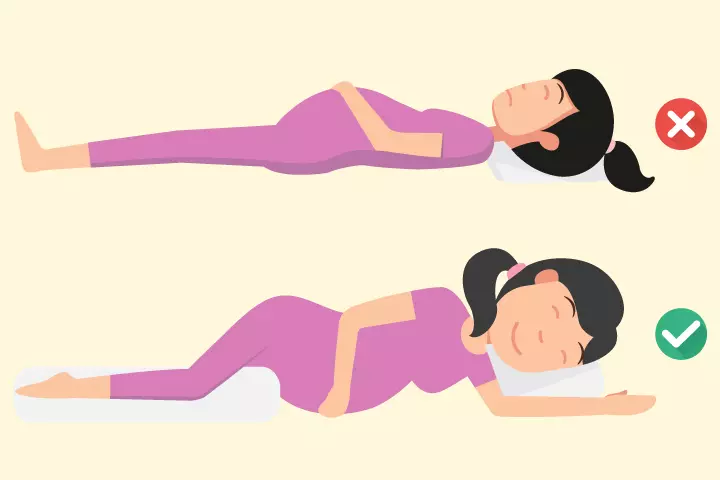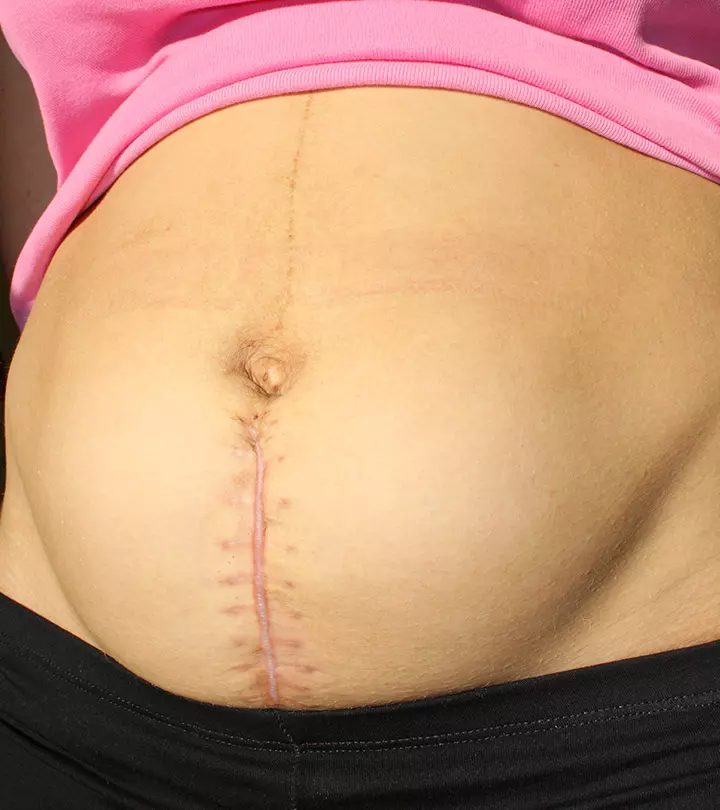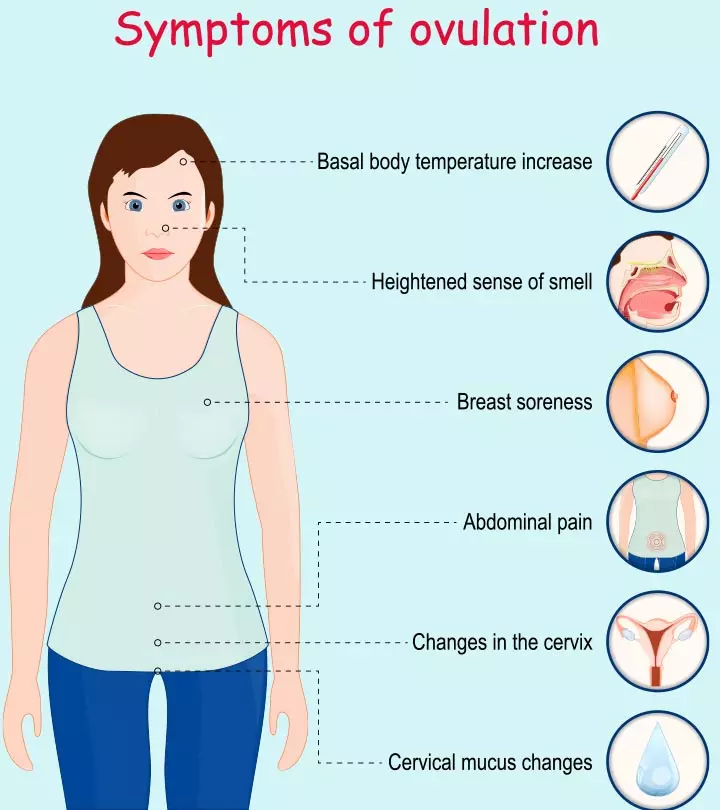
Image: ShutterStock
Finding the right position to sleep comfortably during pregnancy is a struggle for most pregnant women. Although sleeping on your back during pregnancy may be tempting, it is generally not a widely accepted medical recommendation. As relaxing and comfortable it may be, this position is typically safe only during the first trimester. Towards the later trimesters, it may cause complications for the baby and yourself (1) (2).
Getting enough sleep during pregnancy is essential for both the mother’s health and the baby’s development. Knowing the best sleeping positions can improve comfort and help avoid any risks linked to poor sleep habits. Read to know more about sleeping on the back while pregnant, including its side effects and tips to sleep comfortably.
Key Pointers
- Sleeping on the back during pregnancy after the first trimester is not recommended for safety concerns.
- This position may put pressure on the blood vessels and cause reduced blood supply to the fetus, dizziness, difficulty breathing, and low blood pressure.
- It is recommended to sleep on the left side with the support of pillows to improve blood supply to the fetus.
- To achieve peaceful sleep during pregnancy, staying hydrated, taking warm showers, practicing yoga, and meditation can be helpful.
Why Is Sleeping On The Back Not Recommended During Pregnancy?

According to Orlando-based obstetrician and gynecologist Dr. Christine Greves, “Pregnancy dramatically changes your body, and avoiding sleeping on your back is highly recommended to ensure proper blood flow and oxygenation to the uterus.”
Sleeping on your back, especially in later stages, is not recommended during pregnancy for the following reasons:
- The weight of the growing uterus and fetus presses on the inferior vena cava (the large vein that carries deoxygenated blood from the lower body to the heart). It may, therefore, slow down the return of blood to the heart and limit blood flow to the fetus (2) (3).
- The pressure created on the major blood vessels may cause dizziness, lightheadedness, back pain, digestion problems, difficulty in breathing, hemorrhoidsiA condition in which the rectal and anal region veins get swollen. , and low blood pressure (2).
- According to a study published in JAMA Network Open, a supine sleep positioniSleeping on the back with the face facing upwards. in late pregnancy (third trimester) could lead to low birth weight of the infant. In an analysis of 1,760 pregnant women, 57 women who slept on their backs had babies with reduced birth weight (4).
 Did you know?
Did you know?Does Sleeping On Your Back Increase The Risk Of Stillbirth?
The Journal of Obstetrics and Gynecology reports that there is no risk of stillbirth (1).
Several older studies have found that sleeping on the back in the third trimester was associated with an increased risk of stillbirth (5). In fact, a study by researchers in New Zealand has also hypothesized that a supine sleeping position was associated with increased late stillbirthiThe death or loss of a baby before or during birth. risk (6).
However, these studies were not randomized and included a small sample population. Therefore, they cannot be taken as direct evidence.
What Happens If You Wake Up On Your Back?

You need not worry much about waking up on the back since it could happen unknowingly during sleep. In some cases, your body might help you know, as you would start feeling breathless or nauseated even before your baby is affected. It is not likely to cause harm to your baby (7).
How Long Can You Sleep On Your Back While Pregnant?
You may sleep on your back as long as you feel comfortable. As your uterus expands, sleeping on the back may cause discomfort, and you may naturally shift to more comfortable sleeping positions during pregnancy (5).
 Quick tip
Quick tipWhat Is The Correct Maternal Sleeping Position?

Sleeping on your left side is considered a good position as it enhances the blood flow to the baby, your uterus, and the kidneys. Using pillows, one between your knees and the other beneath the abdomen, could make you sleep comfortably. It could create a tilt while sleeping on the side and provide the needed support (8).
Eve, a mother, shares how she used body pillows to sleep on her side during pregnancy. She writes, “The only complaint I have is sleep! For some reason, I have so much trouble sleeping on my side, which makes it very hard to sleep at night. I bought one of those huge body pillows, which helped quite a bit, but I still find myself waking up many times throughout the night. But I’m happy to say last night’s sleep was infinitely better than the prior few nights, so hopefully tonight will be too (i)!”
How To Sleep Comfortably During Pregnancy?
Here are a few tips to get a comfortable and better sleep when pregnant (9).
- Drink more water (or fluids) during the day, and less before sleep time to avoid frequent urination.
- Relaxation techniques such as yoga, breathing exercises, and meditation could relieve your stress and mitigate snoring, sleep apnea, insomnia, or any other sleep disturbances (10).

- Use full-body pregnancy pillows and supportive cushions for extra support. They could make you feel comfortable and improve sleep.
- Do not eat spicy or fried foods as it could lead to heartburn and disrupt your good night’s sleep.
- To prevent nausea, you may have some snacks such as crackers or pretzels. This could also curb your midnight hunger.
- Listen to some relaxing and soothing music before bedtime. It could de-stress you and help sleep better.
- Take a warm shower a few minutes before bedtime. It calms the tensed nerves and improves sleep.

- Practice sleep hygiene. Establish a consistent sleep routine by going to bed and waking up at the same time each day. Avoid using screens in bed (11).
- Ask your partner to give you a massage.
Frequently Asked Questions
1. How to avoid sleeping on my back during pregnancy?
You may place pillows behind your back to stop you from sleeping on your back. Although they may not completely prevent you from sleeping on your back, they make you feel comfortable (10).
2. Can sleeping on my back during pregnancy cause brain damage in the baby?
Sleeping on your back has not been found responsible for any brain damage, developmental disorders, or other conditions such as autism in your baby (12).
3. Can sleeping on my back during pregnancy lead to pelvic pain?
Sleeping on your back during pregnancy may cause pelvic pain as it may increase pressure on your pelvis and spine, leading to discomfort and pain.
4. Can sleeping on my back cause acid reflux during pregnancy?
Sleeping on your back during pregnancy may cause acid reflux. Stomach acid can move freely to the esophagus and lead to reflux symptoms. To prevent this, prop your head and shoulders up when you sleep to prevent stomach acid from coming up (13).
Sleeping on your back while pregnant is safe in the first trimester. However, as your pregnancy progresses, sleeping on your back is not advisable since it can reduce the oxygenated blood supply to the fetus. It can also cause many issues for the mother, such as back pain, lightheadedness, dizziness, and low blood pressure. Thus, mothers are advised to sleep on their left side since it enhances blood circulation to the uterus and the baby. Hence, practice sleeping on your side from the start of the pregnancy to get used to this sleeping position.
Infographic: Sleeping Safe And Well During Pregnancy
Knowing ways to cope with sleep issues and following proper sleep positions could help you get the much-needed rest when pregnant. Here is an infographic to help you choose the correct sleep position and learn some helpful tips to sleep well during pregnancy. Illustration: Momjunction Design Team
Illustration: Is It Safe To Sleep On Your Back When Pregnant?

Image: Stable Diffusion/MomJunction Design Team
Is your habitual back sleeping starting to get uncomfortable for you? Check out this video for tips on how to sleep comfortably during pregnancy.
Personal Experience: Source
MomJunction articles include first-hand experiences to provide you with better insights through real-life narratives. Here are the sources of personal accounts referenced in this article.
i. Sushi while pregnant.https://nutritionbyeve.wordpress.com/2010/01/15/sushi-while-pregnant/
References
1. The advice we give to pregnant women; The Journal of Obstetrics and Gynecology (2019)
2. Pregnancy Sleep Positions; Sleep Foundation.org
3. Jane Warland; Back to basics: avoiding the supine position in pregnancy; The Journal of Physiology (2017).
4. Ngaire H. Anderson, et al.; Association of Supine Going-to-Sleep Position in Late Pregnancy With Reduced Birth Weight A Secondary Analysis of an Individual Participant Data Meta-analysis; JAMA Network Open (2019).
5. Peter R. Stone, et al.; Effect of maternal position on fetal behavioural state and heart rate variability in healthy late gestation pregnancy; The Journal of Physiology (2017).
6. Tomasina Stacey, Ed A Mitchell, and Jane M Zuccollo; Association between maternal sleep practices and risk of late stillbirth: a case-control study; The BMJ (2011).
7. Should pregnant women avoid sleeping on their backs; The Ohio State University Wexner Medical Center
8. Sleeping Positions During Pregnancy; University of Rochester Medical Center
9. How to Get Sleep During Pregnancy; Penn Medicine Lancaster General Health
10. Vivek Kumar, Vibhor Malhotra and Satish Kumar; Application of Standardised Yoga Protocols as the Basis of Physiotherapy Recommendation in Treatment of Sleep Apneas: Moving Beyond Pranayamas; PubMed Central (2018).
11. Sleep position in pregnancy Q&A; Tommy’s
12. Exactly How Bad Is It to Sleep on Your Back When You’re Pregnant?; Cleveland Clinic
13. Nicole Robertson, Satomi Okano, and Sailesh Kumar; Sleep in the Supine Position During Pregnancy is Associated with Fetal Cerebral Redistribution; NCBI (2020)
14. Sleeping positions; The Women’s Center
15. Yasemin Sanlı et al.; Effects of music on sleep quality and comfort levels of pregnant women; NCBI (2021)
16. Verena Wulff et al.; The effects of a music and singing intervention during pregnancy on maternal well-being and mother–infant bonding: a randomised, controlled study; NCBI (2021)
Community Experiences
Join the conversation and become a part of our nurturing community! Share your stories, experiences, and insights to connect with fellow parents.
Read full bio of Dr. Erica Montes
- Dr. Christine Greves is board-certified in obstetrics and gynecology. She has more than 20 years of experience and works in Orlando. Dr. Greves is an advocate of minimally invasive surgery to reduce perioperative pain and accelerate recovery time.
 Dr. Christine Greves is board-certified in obstetrics and gynecology. She has more than 20 years of experience and works in Orlando. Dr. Greves is an advocate of minimally invasive surgery to reduce perioperative pain and accelerate recovery time.
Dr. Christine Greves is board-certified in obstetrics and gynecology. She has more than 20 years of experience and works in Orlando. Dr. Greves is an advocate of minimally invasive surgery to reduce perioperative pain and accelerate recovery time.
Read full bio of Rebecca Malachi
Read full bio of Swati Patwal
Read full bio of Reshmi Das

















